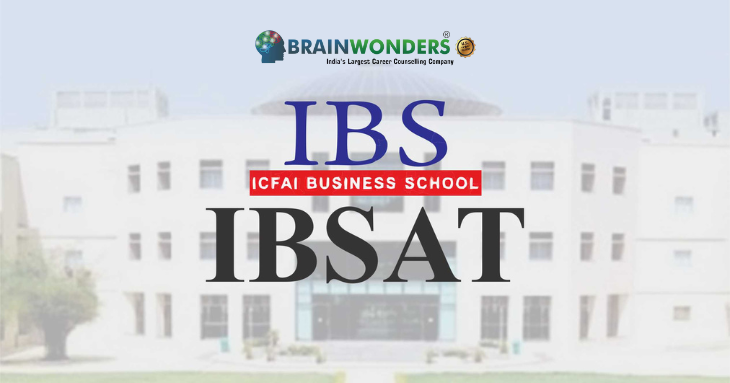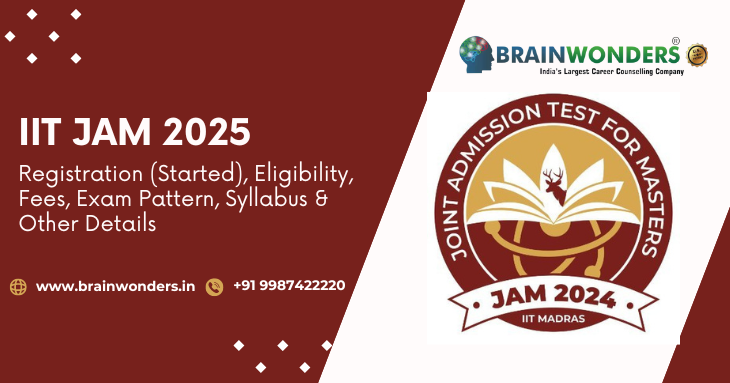

Take Brainwonders Career Test and make the right decisions for your college and course ahead
Let your unique personality, strengths, and traits guide to make the best decdision of your life!
Blog
18 January,2024 | By Brainwonders
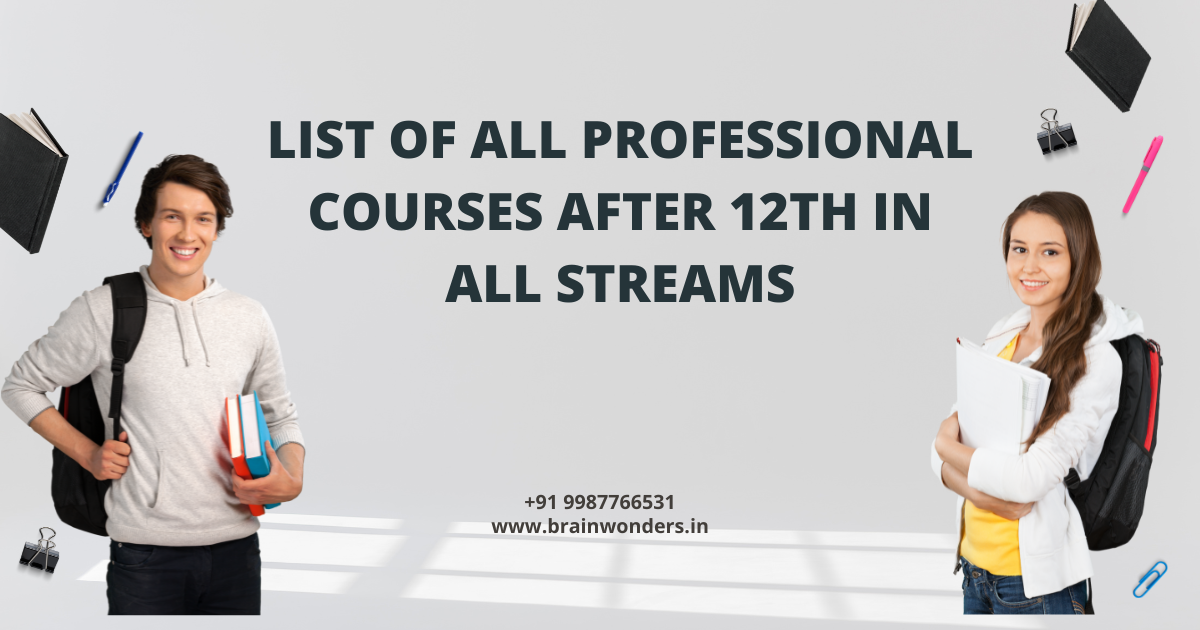
Nowadays, numerous students opt for professional courses soon after finishing their secondary education to kickstart their professional education and advance their careers. However, due to the wide range of options available, students may become bewildered about which course to pursue and which would be most beneficial for their career growth.
A Professional course refers to an educational program that aims to enhance a student's knowledge, skills, and training in a specific professional domain. It is structured to prepare learners with the practical and professional requirements of a field.
Unlike general courses, professional courses are tailored to the specific requirements of a subject matter, emphasising the practical application of concepts.
These courses are usually shorter than regular courses and enable students to rapidly begin their professional endeavours and advance their careers upon completion.
Contrary to popular belief that arts and humanities have limited professional opportunities, there are several professional domains that students can begin exploring immediately after completing their secondary education. Enrolling in professional courses can help students with an arts background launch their careers rapidly.
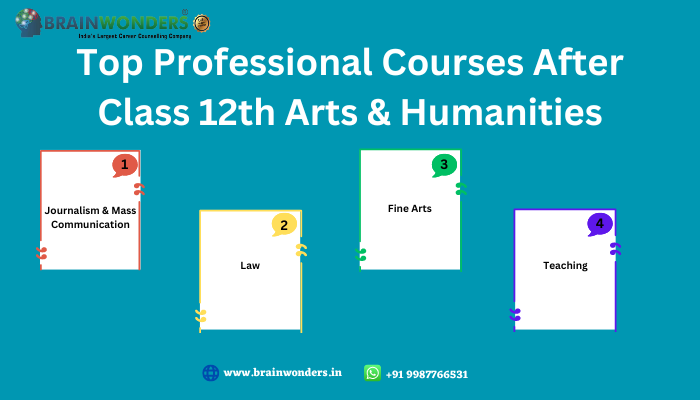
The demand for journalism and mass communication professionals is increasing as the world becomes more globalized and interconnected each day. Therefore, students from an arts and humanities background can benefit greatly from professional courses in this field, especially if they possess skills in mass communication, public speaking, and self-presentation upon completing their secondary education.
| Journalism and Mass Communication Courses After Class 12th | ||
| Course | Mode of Delivery | Average Duration |
| B.A (Journalism & Mass Communication) | Online & Offline | 3 Years |
| Diploma in Journalism & Mass Communication | Online & Offline | 1-2 Years |
| Certificate Courses in Journalism | Online & Offline | 6 Months- 1 Year |
| B.A (Media Sciences) | Online & Offline | 3 Years |
|
Certificate Course in Media Ethics & Governance |
Online | 1 Month |
Law is a highly sought-after professional field to pursue after completing secondary education, and it's not restricted to students from arts and humanities only; individuals from any stream can enter the field of law. Aspiring law professionals can choose from various degrees, diplomas, and certification courses to develop their careers. Additionally, many of these courses are offered online, making them accessible to students regardless of geographical boundaries
| Law Courses After Class 12th | ||
| Course | Mode of Delivery | Average Duration |
| Diploma in Criminology | Online & Offline | 1 Year |
| Diploma in Business Law | Online & Offline | 1 Year |
| Diploma in Criminal Law | Online & Offline | 1-2 Years |
| Certificate Course in Human Rights | Online & Offline | 6 Months-1 Year |
| Certificate Course in Corporate Law | Online | 6 Months |
As a student from a humanities background with an interest in fine arts, there are numerous professional courses available, both online and offline, that can help you develop your skills further and kickstart your career in this field
| Fine Art Courses After Class 12th | ||
| Course | Mode of Delivery | Average Duration |
| Diploma in Fine Arts | Online & Offline | 1 Year |
| Diploma in Fine Arts & Drawing Certification | Online | Short-Term Course (3.5 Hours) |
| BFA (Digital Art) | Offline | 4 Years |
| BFA Photography | Offline | 4 Years |
| Diploma in Sketching & Oil Painting | Online | 6 Months |
If you have a passion for educating and teaching others, beginning your training early is beneficial. After completing your secondary education, several entry-level courses are available that can prepare you for a career in teaching. Below are some courses you can consider to begin your teaching career after completing the course.
| Teaching Courses After Class 12th | ||
| Course | Mode of Delivery | Average Duration |
| Diploma in Elementary Education (D.El.Ed) Certificate | Online | 1 Year |
| Nursery Teachers’ Training (NTT) | Online & Offline | 1 Year |
| Certificate Course in Information and Communication Technology (ICT) in Teaching and Learning | Online & Offline | 4 Years |
| Bachelors of Education (B.Ed) | Offline | 4 Years |
| Diploma in Education (D.Ed) | Distance & Offline | 2 Years |
The times have changed, and obtaining a job in a library is no longer as simple as it once was. Today, large-scale libraries require librarians to have specialized education and training in the field. If you believe that a career in library sciences is a good fit for you, there are several professional courses available in this field that you can pursue to kickstart your career.
| Library Science Courses After Class 12th | ||
| Course | Mode of Delivery | Average Duration |
| Certificate Course in Library Sciences | Online & Offline | 6 Months |
|
Bachelors of Library Sciences (B.Lib) |
Online & Offline | 1 Year |
| Diploma in Library Sciences | Online & Offline | 4 Years |
| Certificate Course in Digital Library | Online | 15 Months |
| Certificate Course in Library and Information Sciences | Online | 6 Months |
Commerce is a broad discipline encompassing many subject areas, providing children with numerous options to explore. As a field closely associated with practical applications, students with a commerce background have ample opportunities to pursue professional careers after completing their class 12th education.
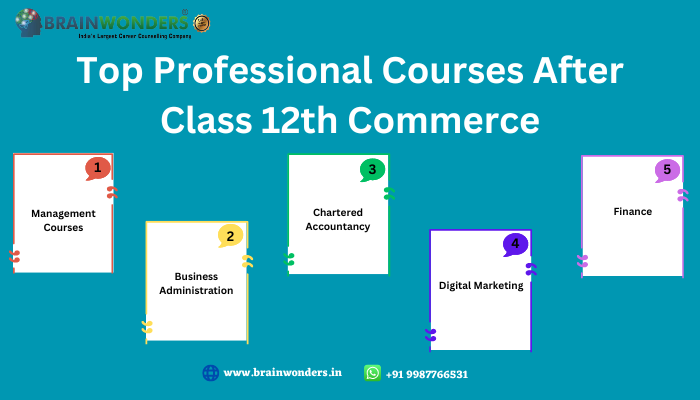
After completing their school education, students can effectively explore fields like business, management, finance, and more through various professional courses. We have compiled a list of top professional courses that students commonly prefer after completing their class 12th education.
Management is the most popular domain among commerce, humanities, and science students. Therefore, it is highly recommended and widely explored by students after completing their school education.
| Management Courses After Class 12th | ||
| Course | Mode of Delivery | Average Duration |
|
Diploma in Hotel Management |
Online & Offline | 3 Years |
| Certificate Course in Project Management | Online | 3-6 Months |
| Certificate Course in Management Consulting | Online | 3-6 Months |
| Diploma in Advertising and Brand Management | Online | 6 Months |
| Diploma in Event Management | Online & Offline | 1 Year |
Business administration is closely linked to management, which involves a comprehensive understanding of the fundamentals of running and developing a business. Students can pursue various online and offline professional courses, specialising in human resource management, strategy management, logistics, finance, marketing, and other areas. The following are some of the most popular business administration courses to consider after completing class 12th.
| Business Administration Courses After Class 12th | ||
| Course | Mode of Delivery | Average Duration |
| Diploma in Business Administration | Online & Offline | 3 Years |
| Diploma in Management | Online & Offline | 1 Year |
| Bachelor of Business Administration | Online & Offline | 3 Years |
| Diploma in Banking and Finance | Online & Offline | 1 Year |
| Certificate Course: Introduction to Marketing | Online | 1-3 Months |
Chartered Accountancy is highly regarded and lucrative, with immense career growth opportunities. It involves various tasks such as auditing, financial management, taxation, etc. In India, the most reputable and widely accepted course for pursuing a career in chartered Accountancy is offered by the Institute of Chartered Accountants of India (ICAI). Additionally, one can also consider pursuing computer courses after 12th in commerce.
Students interested in pursuing Chartered Accountancy after completing their 12th-grade education can enrol in the Foundation Course offered by the Institute of Chartered Accountants of India (ICAI). The course has a duration of around 4-5 years.
| Chartered Accountancy Courses After Class 12th | ||
| Course | Mode of Delivery | Average Duration |
| Chartered Accountancy Course by ICAI | Offline | Nearly 5 Years |
Marketing has traditionally been a popular field for professional ventures in India, but a unique field that has emerged recently is digital marketing. This is due to the increasing popularity and reliance on digital media and channels for all financial transactions. Additionally, for students from an arts background interested in pursuing computer courses, various options are available to explore.
After class 12th, students can pursue specialized courses in digital marketing, which has gained popularity due to the increasing reliance on digital media for consumerism.
| Business Administration Courses After Class 12th | ||
| Course | Mode of Delivery | Average Duration |
|
Diploma in Digital Marketing (By IMTS Institute) |
Offline | 6 Months |
|
Certificate Course in Social Media Marketing (Meta) |
Online | 3-6 Months |
| Diploma in Marketing Management | Online | 1 Year |
| Certificate Course in Marketing Strategy | Online | 3-6 Months |
| Certificate Course in Marketing Management | Online | 6 Months |
After completing their school education, students who wish to pursue a career in finance have numerous online and offline professional courses to choose from. There are several diploma and certification courses available to students at the beginner levels, which are mentioned below.
| Finance Courses After Class 12th | ||
| Course | Mode of Delivery | Average Duration |
| Diploma in Financial Management | Offline | 1 Year |
| Professional Certificate in Corporate Finance | Offline | 3 Months |
| Certificate Course in Corporate Finance | Online | 8 Months |
| Diploma in Financial Services Management | Online & Offline | 1 Year |
| Company Secretary Foundation Programme | Distance Learning | 8 Months |
Science students have a multitude of options when it comes to pursuing professional courses after completing their class 12 education. Apart from exploring courses within the field itself, they can also venture into other disciplines and take up courses in those fields.
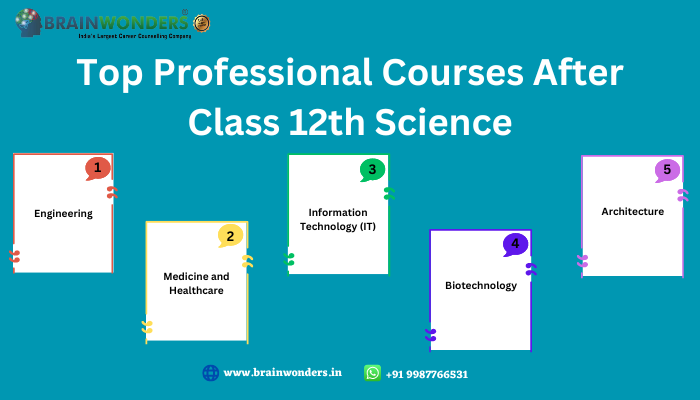
Engineering is a highly popular and esteemed career choice among Indian students after completing their 12th-grade education. The field offers excellent job prospects and has a relatively shorter duration of course completion, making it a popular choice. There are various options for students who wish to pursue a career in engineering in India. However, pursuing a degree or diploma in the field is advisable rather than just obtaining certifications. Additionally, due to the technical and safety aspects of this field, offline courses are preferred over online or distance courses, although online and distance courses are useful for gaining fundamental skills and competence. Here are some of the commonly pursued courses in engineering.
| Engineering Courses After Class 12th | ||
| Course | Mode of Delivery | Average Duration |
|
Bachelor of Engineering (B.E) |
Offline | 4 Years |
|
Bachelor of Technology (B.Tech) |
Offline | 4 Years |
| Diploma in Civil Engineering | Online, Distance & Offline | 1-3 Years |
| Diploma in Architecture Engineering | Distance & Offline | 3 Years |
| Diploma in Mechanical Engineering | Distance & Offline | 3 Years |
The field of medicine is widely recognized as one of the most prestigious and esteemed professional domains. Healthcare is another related field that offers a vast range of job opportunities. Despite the common belief that medicine has limited prospects, students can explore numerous professional domains within the field. Nursing and paediatrics are just a few examples of highly in-demand and well-paid jobs in this field.
Pursuing full-time, offline courses with ample practical training to excel in medicine and healthcare, like engineering, is advisable. Here are some of the commonly pursued courses in this field.
| Medicine and Healthcare Courses After Class 12th | ||
| Course | Mode of Delivery | Average Duration |
|
Bachelor of Medicine, Bachelor of Surgery (MBBS) |
Offline | 5 Years |
|
Bachelor of Pharmacy (B.Pharma) |
Distance & Offline | 4 Years |
|
Bachelor of Physiotherapy (BPT) |
Offline | 4 Years |
| B.Sc Nursing | Offline | 4 Years |
| Diploma in Nutrition and Health Education | Online | 1 Year |
The field of information technology is rapidly expanding due to increasing digitization and technological advancements. Hence, many students aim to enhance their technical and professional skills in this domain soon after school. Pursuing a course in this field immediately after high school helps individuals quickly establish themselves in the industry. Here are some of the popular courses in IT that can be pursued after class 12th.
| Information Technology Courses After Class 12th | ||
| Course | Mode of Delivery | Average Duration |
| Diploma in Computer Applications | Online & Offline | 1 Year |
| Diploma in Web Development | Online & Offline | 1 Year |
|
Bachelor of Computer Application (BCA) |
Online & Offline | 3 Years |
| Certificate Course in C++ | Online | 43 Mins |
| Certificate Course: Introduction to Cyber Security | Online | 3-6 Months |
After completing their education at the class 12th level, students from a science background can explore a field that connects physical and life sciences, which is gaining a lot of interest. There are several professional courses that students can pursue, and some of them are mentioned below:
| Biotechnology Courses After Class 12th | ||
| Course | Mode of Delivery | Average Duration |
| B.E (Biotechnology) | Offline | 4 Years |
| B.Sc (Biotechnology) | Online, Distance & Offline | 3-4 Years |
| Certificate Course in Industrial Biotechnology | Online | 1-3 Months |
| Certificate Course in Bioinformatics | Online | 3-6 Months |
| Certificate Course: Introductory Course on Biotechnology | Online | 37 Mins |
Architecture courses can be pursued as a part of the engineering domain or as a separate field. After completing class 12th, students can choose from various courses in the field of architecture, including architectural engineering and interior design. You can explore various fascinating and exciting career opportunities if you possess the required aptitude and interest in this field. There are several professional courses available to students after completing class 12th.
| Architecture Courses After Class 12th | ||
| Course | Mode of Delivery | Average Duration |
| Diploma in Interior Designing | Online & Offline | 1-2 Years |
| Certificate Course in Interior Designing | Online & Offline | 6 Months |
| Bachelor of Architecture (B.Arch) | Offline | 5 Years |
| Diploma in Architectural Engineering | Distance & Offline | 3 Years |
After completing class 12th, several professional courses are available that are popular among students from all academic streams.
| Common Professional Courses After Class 12th | ||
| Course | Mode of Delivery | Average Duration |
| Digital Marketing Courses | Online & Offline | Variable (depending on whether diploma or certification) |
| Bachelor of Business Administration (BBA) | Online & Offline | 3 Years |
| Bachelor of Computer Applications (BCA) | Online & Offline | 3 Years |
| BFA Photography | Offline | 4 Years |
| Bachelor of Legislative Law (LLB) | Distance & Offline | 5 Years |
After completing 12th grade, students often encounter the significant challenge of selecting a suitable career path. They have numerous options, including pursuing a conventional academic degree or enrolling in a professional course that can enhance their career prospects.
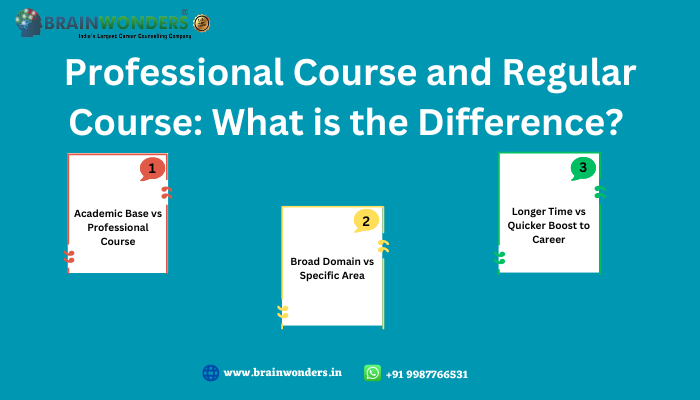
Students frequently find themselves perplexed about the fundamental distinctions between regular academic degrees and professional courses and which would benefit their future. In the following paragraphs, we have outlined the primary parameters that differentiate these two types of courses.
The primary difference between regular and professional courses lies in the course curriculum's focus. A regular course is primarily geared towards theoretical learning and aims to provide students with a strong foundation of academic concepts related to the subject. The focus is on the subject's concepts and theories, and the goal is to make students proficient in the subject's fundamentals.
In contrast, a professional course is more practical-oriented, and while theoretical learning is still imparted, the emphasis is on developing and refining the practical and professional skills of the field. The objective is to equip students with all the technical knowledge and professional skills required to excel in the professional domain.
The second major difference between academic and professional degrees is related to the course's scope. A regular academic course focuses more on the subject area, which is more theoretical. Students usually have the option to choose a specialization (e.g., botany or zoology in B.Sc.), but even within the specialization, there is a broader focus on the basics, subfields, and the history of the development of the field.
In contrast, a professional course has a highly specific focus since the main objective is to equip students with skills and knowledge directly applicable to the profession. As a result, the emphasis is on a narrow and specific domain for the course.
The final and most significant difference between these two types of courses is related to the instruments of the course and the time required for professional establishment. A regular course has a wider range of career options as it has a generalized and broad curriculum. However, since it is primarily academically oriented, students pursuing these courses require more time to establish themselves professionally in the field. In most cases, they must pursue professional courses after completing their primary course to gain the practical skills required to excel in their careers.
In contrast, professional courses are more specific and focused on developing students' professional skills and competencies, helping them quickly establish a career and find professional job roles after completing the course. However, since they have a very specific and narrow focus, the career scope of such courses is limited to the domain in which the person is trained.
Once you comprehend the distinction between the two-course types, a crucial query emerges regarding whether pursuing a professionaal course is viable.
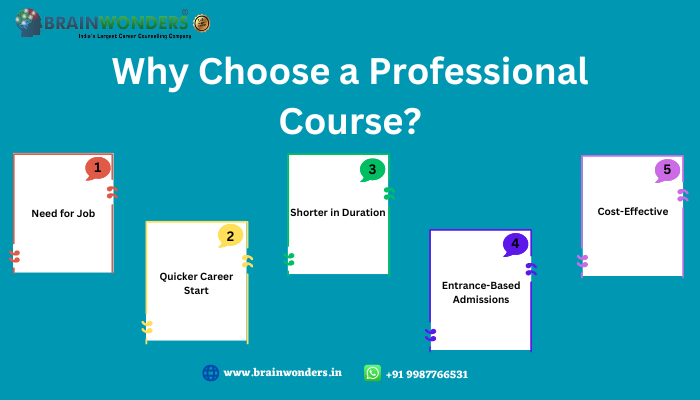
Below, we have enumerated several factors that may render a professional course appropriate for you.
A professional course is a practical educational alternative if you require a job quickly and cannot commit several years to higher education. Upon completion of a professional course, individuals receive professional training in their specific field, which allows them to secure employment in their area of expertise swiftly.
Opting for a professional rather than a regular course can be more beneficial if you want to kickstart your career quickly for any reason. The reason is professional courses are tailored to equip you with the necessary skills and expertise that are in demand in your field of choice. This can enhance your profile and expedite the process of launching your career instead of pursuing a traditional academic degree.
Compared to regular courses, the shorter duration of professional courses is a significant factor in attracting students towards them. This attribute allows for a faster entry into the job market upon completing the course, making it a more desirable option for certain students.
A significant benefit of pursuing a professional course is that admissions are not solely based on past academic performance. Instead, most professional courses have entrance examinations as a criterion for admission. This feature allows students with a genuine interest and aptitude for the subject area to gain admission to the course, regardless of their previous academic performance. As a result, this can be a significant advantage for such students.
Professional courses are often more cost-effective than regular full-time courses due to their shorter duration, making them accessible to students from various backgrounds. Moreover, these courses are valuable as they provide a faster pathway to starting a career post-course completion. However, the cost of a professional course varies depending on the stream and duration of the course. Students should compare and choose a course that best fits their budget and career goals. Therefore, the decision to pursue a professional course should be made based on whether it aligns with one's career objectives and is a suitable alternative.
Online Universities and Institutes Offering Professional Courses after Class 12th
Below are listed some of the leading Indian online universities that offer courses that can be pursued after completing class 12th.
| Online Universities Offering Professional Courses After Class 12th | |
| University | Courses Offered |
| NMIMS Global Access School for Continuing Education (NGASCE) |
|
| Chandigarh University Online |
|
| Jain Online University |
|
| LPU Online University |
|
| Amity Online University |
|
| Online Manipal |
|
| Manav Rachna University Centre for Distance and Online Education (CDOE) |
|
In India, professional courses have long been a favoured choice for higher education among students, providing a solid foundation for launching their careers. The range of professional courses available to students has increased significantly in recent years, with many now offered in online, distance, and traditional classroom settings. These courses are cost-effective and provide students with the opportunity to receive professional training immediately after completing their secondary education, preparing them to enter the workforce confidently.
Q1: Can I do professional courses online?
Ans: Indeed, several professional courses, such as BBA, BCA, etc., can be pursued online and via distance learning modes
Q2: Which field has more scope after the 12th?
Ans: Currently, there are abundant career options available in all fields, allowing students to explore various professional courses in science, commerce, and humanities. Each discipline offers ample opportunities and scope for career growth and development.
Q3: Can I do a diploma in civil engineering after class 12th?
Ans: Certainly, students have the option to pursue a diploma in civil engineering after completing either class 10th or class 12th.
Q4: Can I shift the Humanities stream from science after the 12th?
Ans: In the Indian education system, students who have completed their studies in science during classes 11th and 12th have the flexibility to shift to humanities or commerce for further education.
Q5: Which professional course is best for a commerce student?
Ans: After completing class 12th in commerce, numerous professional courses are available for students. Some popular courses include Chartered Accountancy (CA), Business Administration, Marketing, and Finance-related programs.
Q6: Is a professional course worth it?
Ans: Professional courses are particularly beneficial for individuals seeking to develop practical, job-oriented skills immediately after completing their secondary education and those who wish to kick-start their careers quickly.
Q7: Can I do online B.Tech after the 12th?
Ans: Regrettably, B.Tech degree courses are only available in offline mode in India. However, professionals can explore Work-Integrated Learning Programmes (WILP) courses for B.Tech. As of now, there are no online degree courses available for B.Tech.
Q8: Which is a cheaper professional or regular course?
Ans: Typically, professional courses offer a more cost-effective option, in addition to enabling students to kick-start their careers more quickly than through a traditional academic course. However, the cost comparison between regular and professional courses varies depending on the course specialization and duration.
Take Brainwonders Career Test and make the right decisions for your college and course ahead
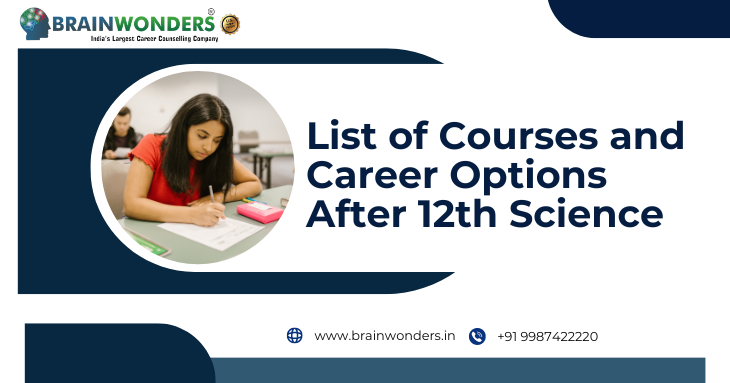
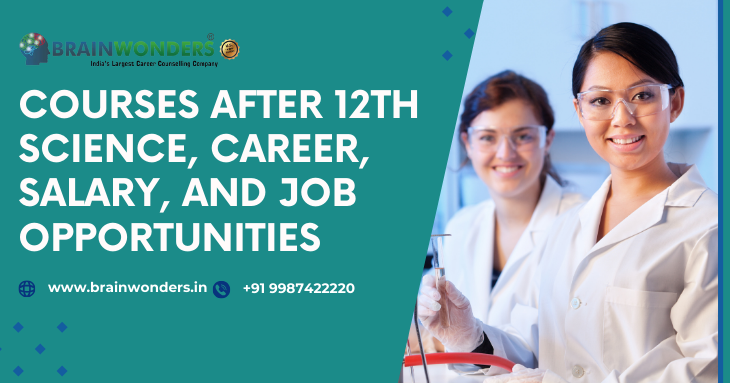
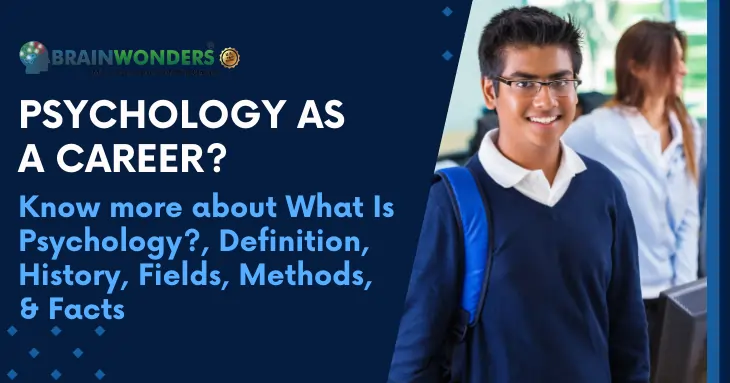
,_Syllabus,_Pattern,_Old_Question_Papers.png)
